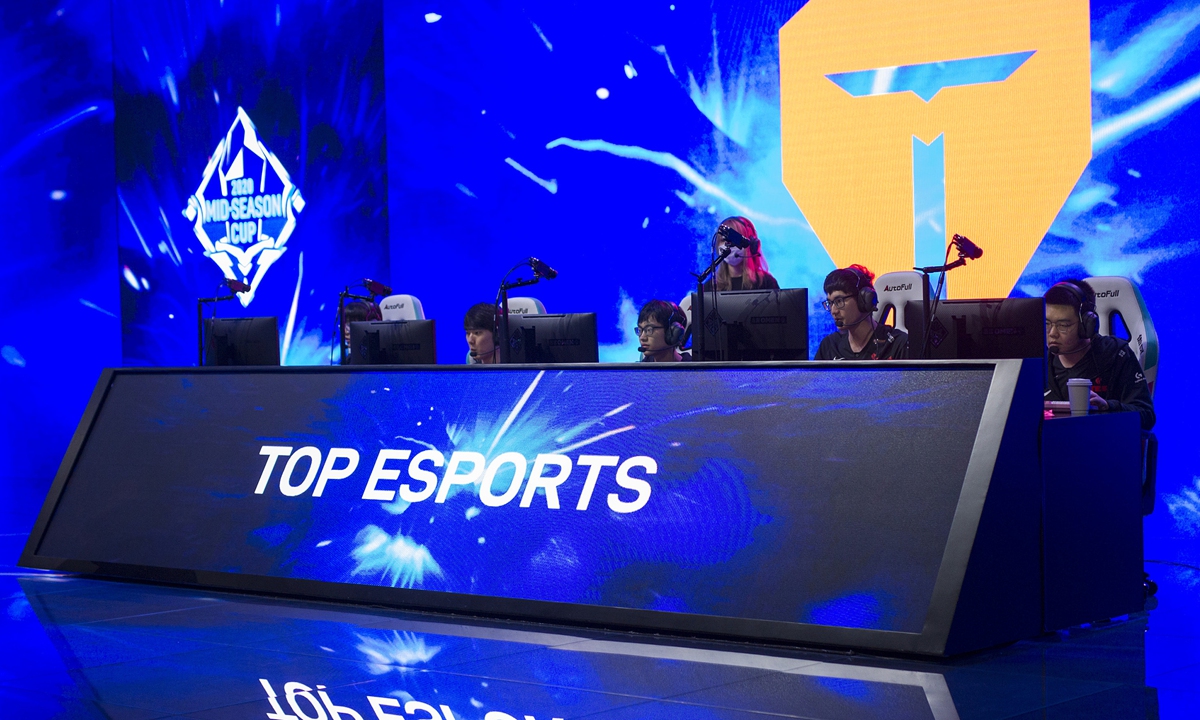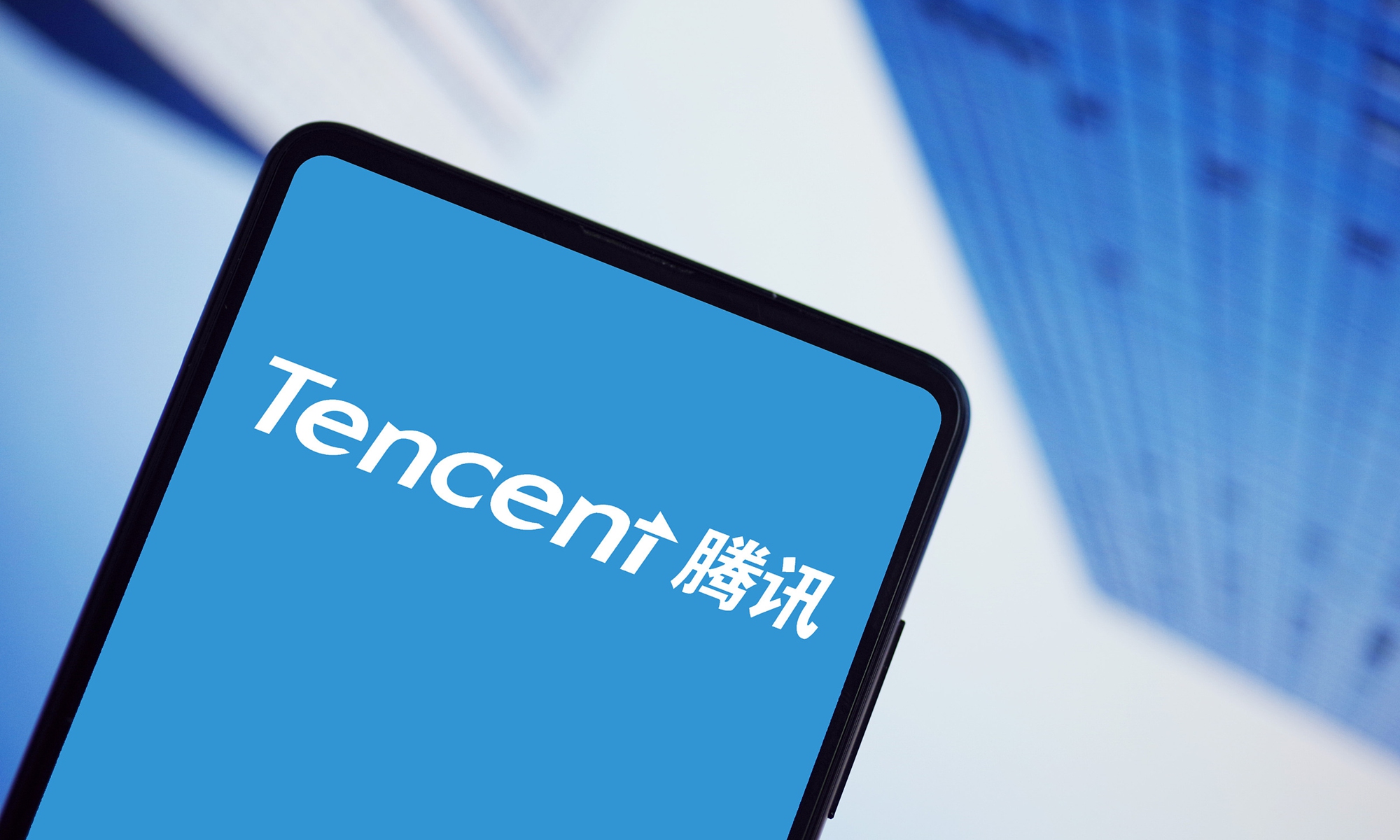Facebook suspected behind Tencent ban, which hurts US gaming companies
By GT staff reporters Source: Global Times Published: 2020/9/18 13:58:40

Gamers compete in an esports tournament. Photo: VCG
The US Commerce Department has issued an order Friday to stop people in the US from downloading Tencent's omnipotent messaging app WeChat and the popular short video app TikTok starting from September 20.
It will prohibit "Any provision of service to distribute or maintain the WeChat or TikTok mobile applications, constituent code, or application updates through an online mobile application store in the US," read US Department of Commerce statement on Friday.
On Thursday, the Committee on Foreign Investment in the US (CFIUS) asked about US video game companies' involvement with Tencent, which holds significant stakes in Epic Games, Riot Games and other gaming companies in the US, Bloomberg reported.
In the name of the so-called "security concerns," the Trump administration looks to strike the world's largest gaming company and China's second largest company by market value by requiring the companies' protocols for handling Americans' personal information.
However, if the US tries to do to Tencent what it has done to Huawei and TikTok, it may spark a chain reaction in the US video gaming industry, as Tencent has a majority stake in key US game companies.
It owns Valorant and League of Legends developer Riot Games, and holds a 40 percent stake in Fortnite maker Epic Games. It also owns roughly 5 percent of Activision Blizzard. Analysts warned that half of US gaming companies might be impacted due to the US government's latest requirement.
In addition, Tencent works as a gatekeeper for American companies looking to present their games in front of Chinese screens. For example, Activision partnered with Tencent to bring the game Call of Duty to China.
According to its second-quarter earnings report, Tencent's online gaming revenue in domestic and overseas markets soared by 40 percent in the second quarter to 38.29 billion yuan ($5.67 billion) amid the coronavirus pandemic.
"In this aspect, the Trump administration cannot easily crack down on the most powerful gaming company in the world, but it is evident that it has had a plan against Tencent and to 'kill' it, even if it targeted the wrong business under Tencent - WeChat in the US," Zhang Xiaorong, director of the Beijing-based Cutting-Edge Technology Research Institute, told the Global Times on Friday.
It is highly probable that US social media firms such as Facebook and Twitter are behind the tighter clampdown on Tencent, as it is in their interest to prevent the penetration of the Chinese social media giant in the US market, Sun Hui, chairman and CEO of Beijing Lucky99 Software Technology, told the Global Times on Friday.

Tencent Logo Photo:VCG
Tencent's business consists mainly of social media and gaming, with the former being relied on to attract traffic, and the latter underpinning its earnings. WeChat, with daily active users of a billion, is ubiquitous in China and indispensible for the Chinese American community, making it feasible for the app to pursue a foothold in the US, Sun, a gaming industry veteran, said.
In an effort to defy the ban targeting WeChat, the US WeChat Users Alliance was initiated shortly after the executive order announcement. The alliance has filed a motion in the federal court of San Francisco seeking a preliminary injunction against the WeChat ban.
Latest media reports suggest that a US judge in San Francisco is willing to temporarily halt the ban on WeChat following requests by its users. A final decision was not issued by the judge as of press time.
Tencent is either preparing for its overseas expansion or has plans to do so, Sun said, adding that the prospect of WeChat's invasion into the turf of Facebook and Twitter could prompt them to lobby for tighter scrutiny over Tencent to eliminate the hidden dangers of being rivaled by Tencent's WeChat one day.
Gaming firms would actually hope for a bigger involvement in the US market from Tencent, which might reduce their reliance on Apple's App Store that eats into their revenue, he said.
Trump issued two executive orders on the same day in early August, proposing to ban Tencent's WeChat and ByteDance's hugely popular short video app TikTok, citing national security concerns.
Liu Dingding, an independent internet analyst in Beijing, said the motive behind the latest scrutiny of Tencent is the Trump administration's aim to slow down China's development in the technology sector - an area that had been traditionally dominated by the US.
"Tencent may become the third Huawei and second TikTok," he warned.
"What Tencent may lose is only money from the US if Trump tightens his scrutiny, but to the US, the most impacted groups will be American game developers, partners and a great number of gamers," Liu said, noting that "it would be a devastating blow to the US gaming industry."
Even if the revenue share of gaming in Tencent dropped from 57 percent in 2014 to 30 percent in 2019, it still significantly contributes to a behemoth whose market value has already hit $HK5.03 trillion ($650 billion).
Not the last target
Media reported on Friday that a potential deal for a TikTok sale had been reached with US software company Oracle, but is currently awaiting Trump's approval.
Li Haidong, a professor at the Institute of International Relations of the China Foreign Affairs University, hailed ByteDance as a good example for other potential Chinese "targets."
"It shows how a Chinese company tries to confront the arbitrary US crackdown through legal and commercial means. Trump hasn't received the money he had wished for," Li told the Global Times.
Tencent will not be the Trump administration's last target as China's high-tech growth is irresistible.
Zhang suggested Chinese companies which suffered from unfair treatment in the US use legal means. In addition, for Chinese firms eyeing an overseas expansion, they should try to lobby local government officials, he added.
Posted in: COMPANIES